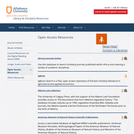
A guide to Open Access Resources consisting of scholarly journals, student dissertations, legal repositories, scientific publications and more.
- Subject:
- Education
- Material Type:
- Data Set
- Provider:
- Athabasca University
- Date Added:
- 09/08/2016

A guide to Open Access Resources consisting of scholarly journals, student dissertations, legal repositories, scientific publications and more.
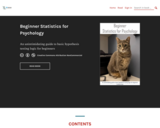
An unintimidating guide to basic hypothesis testing logic for beginners
Word Count: 45834
(Note: This resource's metadata has been created automatically by reformatting and/or combining the information that the author initially provided as part of a bulk import process.)
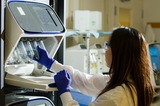
Students will explore the steps in conducting scientific investigation in Agriculture and discuss safety precautions that should be followed in conducting agricultural research. Lesson plan from the New Mexico Animal, Plant, and Soil Science Lesson Plan Library.
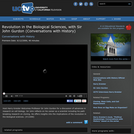
Host Harry Kreisler Welcomes Professor Sir John Gurdon for a discussion of advances in research on cell biology. Sir John reflects on his career as a scientist including his path breaking research on cloning. He offers insights into the implications of the revolution in the biological sciences.(46 min)

Short Description:
This open resources textbook contains 10 Units that describe and explain the main concepts in statistical analysis of psychological data. In addition to conceptual descriptions and explanations of the basic analyses for descriptive statistics, this textbook also explains how to conduct those analyses with common statistical software (Excel) and open-source free software (R).
Word Count: 27173
(Note: This resource's metadata has been created automatically by reformatting and/or combining the information that the author initially provided as part of a bulk import process.)

This video highlights students taking scientific measurements to support investigations in atmospheric science, hydrology, soils, and land cover. It shows students reporting data through the Web, creating scientific visualizations for analysis, and collaborating with students and scientists around the world. This is one two introductory videos in the 24-part GLOBE video series. GLOBE (Global Learning and Observation to Benefit the Environment) is a worldwide, hands-on, K-12 school-based science education program.

This video highlights students taking scientific measurements to support investigations in atmospheric science, hydrology, soils, and land cover. It shows students reporting data through the Web, creating scientific visualizations for analysis, and collaborating with students and scientists around the world. This is one of two introductory videos in the 24-part GLOBE video series. GLOBE (Global Learning and Observation to Benefit the Environment) is a worldwide, hands-on, K-12 school-based science education program.

Short Description:
Research posters and presentations from the 2021 annual Applied Research Symposium
Word Count: 2839
(Note: This resource's metadata has been created automatically by reformatting and/or combining the information that the author initially provided as part of a bulk import process.)
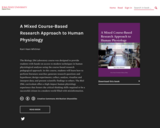
Short Description:
The Biology 256 Laboratory course was designed to provide students with hands-on access to modern techniques in human physiological analyses using the course-based research pedagogical approach. In this course, students will learn how to perform literature searches; generate research questions and hypotheses; design experiments; collect, analyze, visualize and interpret data; and present scientific findings to others. The Biol 256L curriculum offers a high-impact human physiology experience that fosters the critical thinking skills required to be a successful citizen in a modern world filled with misinformation.
Long Description:
The Biology 256 Fundamentals of Human Physiology Laboratory course was designed to provide students with hands-on access to modern techniques in human physiological analyses using the course-based research pedagogical approach. In this course, students will learn how to perform literature searches; generate research questions and hypotheses; design experiments; collect, analyze, visualize and interpret data; and present scientific findings to others. The Biol 256L curriculum offers a high-impact human physiology experience that fosters the critical thinking skills required to be a successful citizen in a modern world filled with misinformation.
Word Count: 53567
(Note: This resource's metadata has been created automatically by reformatting and/or combining the information that the author initially provided as part of a bulk import process.)
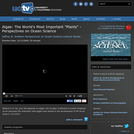
Believe it or not, your life depends on algae! Join Scripps' Institution's Russell Chapman as he discusses the important roles algae have played in the development of life as we know it. (55 minutes)
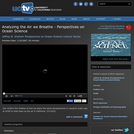
Join UCSD's Kim Prather to find out about the latest developments in research under way at UCSD to help clean up the air in California. (56 minutes)
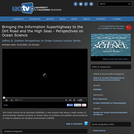
Join Frank Vernon as he discusses ROADNet, a new project that allows a wide variety of environmental research projects to stream data via Wireless and satellite communications in order to observe our dynamic environment. (29 minutes)
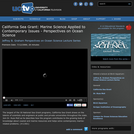
The largest of the 30 National Sea Grant programs, California Sea Grant draws on the talents of scientists and engineers at public and private universities throughout the state. Join Dr. Russ Moll as he describes how the program contributes to the growing body of knowledge about coastal and marine resources and helps solve contemporary marine-related problems. (26 minutes)
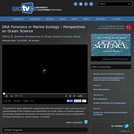
The advent of rapid methods for sequencing DNA has resulted in major advances in our understanding of the Evolution and distribution of a wide variety of marine organisms. Join Scripps researcher Ron Burton as he describes the surprising array of applications for these techniques in marine science. (56 minutes)
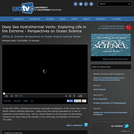
In the late 1970s, scientists conducting a geologic investigation of the ocean floor in the Pacific made a startling discovery - deep ocean hot springs populated by a host of organisms never before seen. Join Dr. Horst Felbeck as he describes his fascinating research into what makes life possible in this seemingly inhospitable environment. (43 minutes)
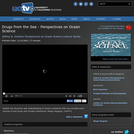
Explore the discovery and understanding of marine symbionts that may provide novel sources of new drugs with Scripps Institutions' Margo Haygood. (27 minutes)
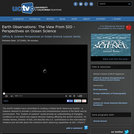
The world's leaders have committed to creating a Global Earth Observing System - a massive network to provide a continuous and comprehensive picture of the Earth and its environment. This "system of systems" would provide an understanding of changing conditions on our Planet and support decision-making affecting the world's economy. Dr. Charles Kennel, Director of SIO, will describe the U.S. contributions to this international initiative and will talk about the extensive Earth observing capabilities at SIO. (59 minutes)
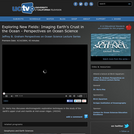
Dr. Kerry Key discusses electromagnetic exploration techniques in the study of the earth's upper crust and mantle at mid-ocean ridges. (43 minutes)
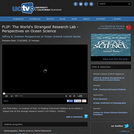
Join Fred Fisher, co-inventor of FLIP, or Floating Instrument Platform as he shares a unique look at this strange research vessel's rich history. (37 minutes)
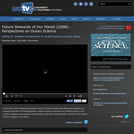
Learn about the challenging research work of three outstanding fellowship students at Scripps Institution of Oceanography. Explore topics as diverse as climate science, sub-seafloor mapping and coastal oceanography and hear and studentsŐ visions for the future of their research. (49 minutes)